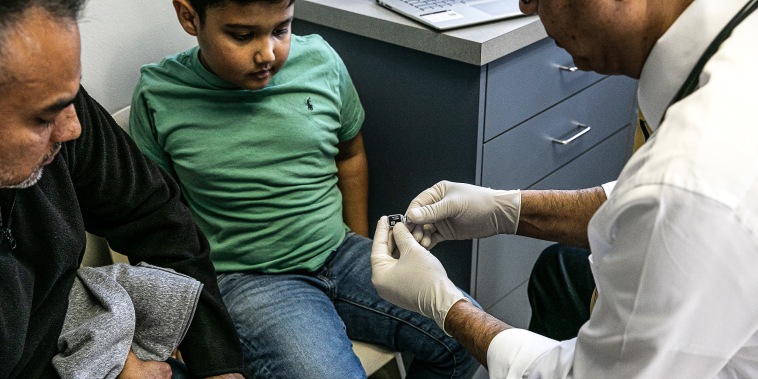Like many parents of small children, Amber van Moessner has caught Covid-19 from her two kids twice.
Last December, van Moessner’s younger son was the first to get sick. At 4 months old, he was too young to get vaccinated. Eventually, the rest of the family got Covid as well.
So she was excited when the Food and Drug Administration cleared a new round of updated booster shots on Sept. 11. The Centers for Disease Control and Prevention recommended the booster for people 6 months and older.
But like a lot of parents, van Moessner hasn’t been able to get her children vaccinated. Pharmacies near where her family lives in Kinderhook, in New York’s Hudson Valley, aren’t taking many appointments for children because they have fewer child-size doses, if any.
What’s more, van Moessner said she has had trouble getting answers about when doses might become available.
‘I was hoping to be able to get my younger child vaccinated because he’s never been eligible for a Covid shot,’ she said. ‘Now I’m in this holding pattern.’
Neither van Moessner’s pediatrician nor county health department could tell her when the vaccine would become available near her. She tried the vaccines.gov website, which said the vaccine was available at pharmacies near her. But the pharmacies’ own websites said they didn’t have it.
And unlike the initial vaccine rollouts in 2020-21 and the prior booster rollout in 2022, there are not many pop-up clinics where children can get vaccinated. That’s a problem for parents of the youngest children. Most states do not allow pharmacists to prescribe vaccines, and about half of them bar pharmacists from vaccinating children younger than 3.
Why this vaccine rollout is frustrating parents
When the first Covid vaccines became available in late 2020, the federal government bought and distributed the vaccine doses to pharmacies and other providers. The same happened with the vaccine boosters in 2022. But that’s not happening this year.
‘This is the first time that there’s been a move to the commercial vaccine market, so there were some difficulties even for adults that were caused by insurers and sometimes pharmacies,’ said Cynthia Cox, a vice president at the nonprofit research organization KFF.
The vaccine rollouts under the government’s watch had issues, too. But Cox said the current one has been marked by confusion about insurance coverage rules, supplies and appointment availability.
The vaccines also have to be refrigerated at specific temperatures before they can be administered, and that could be a problem for pediatricians’ offices.
The biggest problem, Cox theorized, is that providers don’t want to waste money by ordering doses that won’t be used.
‘Providers have to pay upfront for the cost of the dose, and they have to hope there’s enough demand to access it,’ she said. ‘There’s a financial incentive to underestimate demand, or not even purchase it if you think there’s too much chance of parents not bringing their children in.’
That applies to all Covid vaccines this time around. But children require smaller vials of the vaccine than adults. Providers have to decide how much of each of those they want to buy.
And vaccination rates for children have consistently been lower than for adults. According to a poll by KFF, about two-thirds of parents with children under age 12 say they won’t get them vaccinated against Covid.
Still, that leaves millions of parents who want to get their children vaccinated, and who are having a hard time doing it. And they’re frustrated about it.
‘It’s entirely on us to make sure that we are getting the right vaccine and hunting it down,’ van Moessner said. ‘Parents through Covid are immensely on their own.’
Yuen Kwan, a medical interpreter in metro Boston, was also frustrated by her experiences. She said she works at a pediatric hospital that, so far, hasn’t been able to secure pediatric doses.
“I don’t personally know anyone who has been able to get their child vaccinated,” she said. “A couple of kids in my son’s class already caught Covid the last couple of weeks.”
Kwan said she is especially concerned about her 80-year-old mother, whom her family sees often. But if the situation doesn’t improve, she said she is worried it’s just a matter of time before someone in her family gets sick.
“I feel like a sitting duck,” she said.
Those problems aren’t only affecting young children. Erin Belieu, a poet and a professor at the University of Houston, said she and her son are both considered high-risk for severe Covid. She wanted to help him get vaccinated, but struggled to find doses near his small-town college in Ohio.
‘It becomes a part-time job, just trying to find vaccines for your children,’ Belieu said. ‘I called something like 15 pharmacies, and I finally found a sympathetic person who answered the phone and who gave me the tip that if you go to one of the CVS [locations] inside of a Target, people don’t really know they’re there,’ meaning they might have extra doses.
Belieu said her son drove 30 miles to one such CVS location to get vaccinated. But she and van Moessner both noted that they had more time and resources than most people to try to track down vaccine doses.
‘It’s really frustrating that nobody seems to have the wherewithal to do a vaccine rollout three years into this,’ van Moessner said. ‘I just find that unacceptable.’
